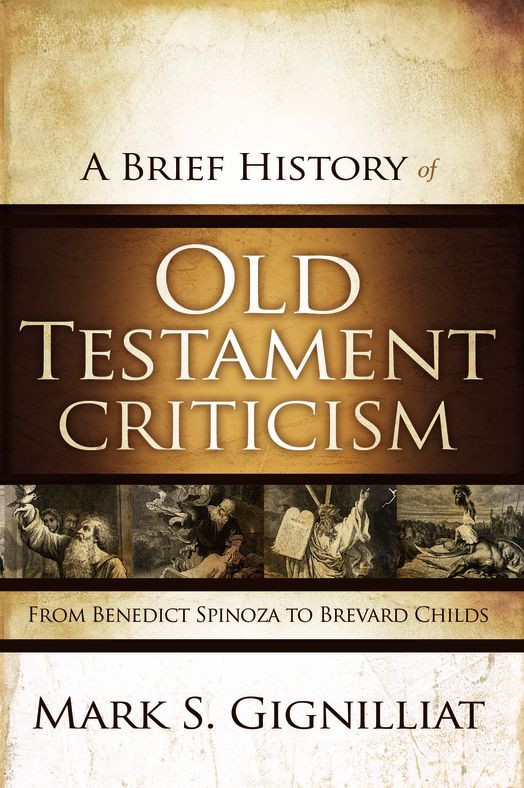On my trip to India over spring break—which you can read a little bit about here—I brought along a delightful little introduction to Old Testament Criticism by Mark S. Gignilliat, called, A Brief History of Old Testament Criticism: From Benedict Spinoza to Brevard Childs (check it out on Amazon). Gignilliat, who is Associate Professor of Divinity/Old Testament at Beeson Divinity School (Samford University), holds a doctorate from the University of St Andrews (which is, btw, a #legit University; check out this video for proof). I absolutely enjoyed reading this book and I think many of our readers here at The Two Cities would benefit from it.
In general, I love reading books that overview various movements within scholarship (in a word: Forschungsgeschichte). I find these to be a helpful way to synthesize how various ideas came about and where they fit historically, both in relation to the contexts and cultures that produced the ideas and the where those ideas fit within the history of a given discipline. Within biblical studies some of the more interesting and helpful have been Schweitzer’s Paul and His Interpreters, Neill & Wright’s The Interpretation of the New Testament: 1861–1986, and Hasel’s Old Testament Theology: Basic Issues in the Current Debate (and, I should say, once N. T. Wright’s forthcoming Paul and His Recent Interpreters emerges it will be a fantastic read as well). And so, because I enjoy books like this a lot, I thoroughly enjoyed reading A Brief History of Old Testament Criticism.
The book is broken down into seven chapters, each looking at the life and contributions of the most significant and influential scholars within the history of Old Testament Criticism. The chapters are on Benedict Spinoza (1632–1677), W. M. L. De Wette (1780–1849), Julius Wellhausen (1844–1918), Herman Gunkel (1862–1932), Gerhard von Rad (1901–1971), William Foxwell Albright (1891–1971), and Brevard S. Childs (1923–2007). It was fascinating to recall the development of ideas related to Old Testament Criticism, to see how they connect and develop, but also to get a better sense of who the people were who made such paradigm-shifting contributions to a field that is still largely indebted to their scholarship.
I do have one minor quibble with the book. The book feels a bit like a Heilsgeschichte—the advances of scholarship lead to a historical-critical climax in the work of Brevard S. Childs. So the structure of the book functions as an implicit argument for Childs’s work. As well, Gignilliat cites Childs throughout (e.g., pages 49, 99, 103, 119, 141) and what he says in the conclusion of the Brevard Childs chapter is certainly the most positive of all the others surveyed in the book (pp. 165–167). Gignilliat even admits in the postscript: “As the reader can tell, I have high regard for the canonical approach and Brevard Childs” (p. 169). Since Childs was Gignilliat’s Großdoktorvater—Gignilliat studied under Christopher Seitz—it is certainly to be expected that Gignilliat would favor the work of Childs. When critiquing the ideas of those surveyed in the book, Gignilliat would often say very Childs-esque things and things in keeping with the “Theological Interpretation of Scripture” [TIS] movement. At times this was quite jarring for me since these criticisms were written in a way that suggested to me that the implied reader would have the same TIS sort of opinions. Since I don’t share that perspective I found myself pushing back at times and scribbling my rejoinders in the margins. Rather than recount all of the examples of this I just want to notify readers of the book’s overall perspective (e.g., pages 26, 27–28, 84–85, 89–90, 99, 118, 121 for TIS comments). I especially take issue with the expanded TIS comment on page 140. Although Gignilliat reassures the reader that history is important for interpreting the Old Testament, he critiques those who use biblical backgrounds as a “Gnostic key” to unlock the meaning of the Bible. But what’s truly Gnostic: to downplay the historically and culturally conditioned nature of the Bible, or not? Without pressing this any further, I’ll just state that I’m not the biggest fan of the TIS movement; the task of exegesis is not over!
All said, A Brief History of Old Testament Criticism by Mark S. Gignilliat is a fantastic book worth reading. I think this book would be especially beneficial to those who went through Seminary and have a vague idea of the major players involved in Old Testament studies, or those who weren’t really introduced to Old Testament Criticism at all. But also, this book would be a fantastic introduction for students, even at the undergraduate level. If I ever get the opportunity to teach an Old Testament Survey course I would love to supplement my lectures with Gignilliat’s text. So as a final assessment, I certainly recommend this book, especially to undergraduates and seminarians.
I would like to thank the fine people at Zondervan Academic for sending along this review copy to me.





6 Comments
Leave your reply.